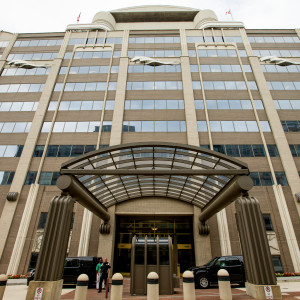President-elect Donald Trump’s latest pick for his Federal Communications Commission transition team is not simply opposed to net neutrality, like those previously named, but questions whether the agency has the legal authority to protect consumers at all.
On Monday, Trump added Roslyn Layton, a fellow at the conservative policy think tank American Enterprise Institute, to his FCC transition team of fellow AEI scholars Jeffrey Eisenach and Mark Jamison. All three are critics of the agency’s divisive net neutrality rules, and while one has questioned whether we need the agency at all, its newest member doubts the legality of its number one mandate under Democratic Chairman Tom Wheeler — protecting consumers.
“[T]he FCC claims that ‘protecting consumers is part of its DNA,'” Layton wrote for AEI in October. “However, a review of the FCC’s rules and the 1934 Communications Act that founded the agency shows that consumer protection was not a base concept of the agency at all. At best, one could argue that this concept has evolved as a (quite liberal) interpretation of the FCC’s mission. At worst, it’s a statement the FCC makes up to justify rulemaking which is otherwise not part of their mission — perhaps even unlawful.”
Layton and other critics of Wheeler’s aggressive, big item agenda say the FCC has repeatedly gone out of its lane during his three-year tenure at the helm with the passage of net neutrality and privacy rules, both claiming jurisdiction over internet service provider (ISP) activity previously regulated by the Federal Trade Commission.
“While the notion of consumer protection is sovereign, the FCC does not conform to any such consumer bill of rights. Rather, the agency seems to define ‘consumer rights’ to suit its preferred policy outcomes,” Layton said. “The FCC calls this ‘adapting and modernizing to keep up with the times.’ While it’s laudable that an agency wants to evolve, it’s the job of Congress to decide whether the agency should be updated, or whether it should even exist at all.”
While Congress’ 1996 update to the Communications Act does charge the agency with protecting private consumer information collected by telephone providers and ensuring consumers have competition in the TV navigation device market, it also classified internet connectivity as an information service outside of the FCC’s authority. Under Wheeler’s leadership (and at the behest of President Obama, Republicans suspect) the agency took it upon itself to reclassify the internet as a public utility service, subject to stricter FCC authority meant to regulate telephone monopolies.
According to Layton, one of her transition team colleagues and technical experts in the entertainment and telecommunications industries, Wheeler’s FCC championed regulatory policies with “propaganda” advocating consumer protection, many aligned with the Obama administration’s partiality to Silicon Valley giants like Google.
The Alphabet-owned search giant and others, including Netflix and Facebook, essentially gained free high-bandwidth content transmission from net neutrality, along with protection from competition in the data monetization market they already dominate with ISP privacy rules. An abandoned proposal to open up the set-top box market backed strongly by Google would have let the company compete with cable and satellite TV providers by building their own boxes — a proposal Google asked be free of the data collection restrictions those providers must follow.
Regardless of their supposed intent, the strategy worked — securing more than 4 million public comments at the FCC in favor of net neutrality and landing major endorsements from Consumer Reports.
“The segmentation of a wide range of heterogeneous individuals with different wants and needs into a single category of ‘consumer’ has been an expert political manipulation, and has allowed for the fabrication of an artificial constituency which political actors leverage for pre-ordained goals,” Layton wrote. “Too bad then for real consumers, who are actually worse off by the FCC’s policies, which serve its special interest groups masquerading in the name of consumers as whole.”
In a number of op-eds scrutinizing Wheeler’s FCC, Layton points out net neutrality, privacy and set-top box rules were all drafted absent documented consumer complaints of web traffic throttling, consumer privacy violations, economic impact studies and analyses of changing markets like video, where many providers are moving to apps in place of boxes altogether.
“Chairman Wheeler’s three years at the FCC have broken records in partisanship, with more votes along party lines for rulemaking than previous commissions combined,” Layton wrote for InsideSources in October, referring to a recent public haranguing of Wheeler by Senate Commerce Committee Chairman John Thune, who’s leading an FCC reauthorization bill aimed at reigning in the agency and making its rulemaking process more transparent.
Under Layton’s advisement, a Trump FCC may be far more beholden to Congress than the previous commission.
“Let’s hope that Congress can put the agency right before the Supreme Court needs to act,” she said of the Open Internet Order in June.

